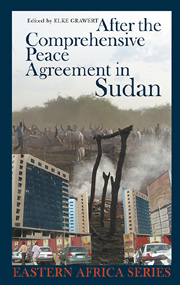Book contents
- Frontmatter
- Contents
- List of Tables & Figures
- Editor's Preface
- Notes on Contributors
- List of Acronyms
- Map of Sudan
- 1 Introduction
- I Implementation & Potential of the CPA
- II Challenges Facing Post-war Societies in Sudan
- 5 The CPA & Beyond
- 6 Ethnic Identity Politics & Boundary Making in Claiming Communal Land
- 7 Return Migration to the Nuba Mountains
- 8 Challenges of Basic Education in Southern Sudan
- 9 Abduction, Confinement & Sexual Violence against South Sudanese Women & Girls in Kakuma Refugee Camp, Kenya
- 10 Identity, Citizenship & Reintegration
- III The CPA in its Sub-regional Context
- IV Beyond the CPA
- Index
- EASTERN AFRICAN STUDIES
5 - The CPA & Beyond
Problems & Prospects for Peaceful Coexistence in the Nuba Mountains
from II - Challenges Facing Post-war Societies in Sudan
Published online by Cambridge University Press: 05 April 2013
- Frontmatter
- Contents
- List of Tables & Figures
- Editor's Preface
- Notes on Contributors
- List of Acronyms
- Map of Sudan
- 1 Introduction
- I Implementation & Potential of the CPA
- II Challenges Facing Post-war Societies in Sudan
- 5 The CPA & Beyond
- 6 Ethnic Identity Politics & Boundary Making in Claiming Communal Land
- 7 Return Migration to the Nuba Mountains
- 8 Challenges of Basic Education in Southern Sudan
- 9 Abduction, Confinement & Sexual Violence against South Sudanese Women & Girls in Kakuma Refugee Camp, Kenya
- 10 Identity, Citizenship & Reintegration
- III The CPA in its Sub-regional Context
- IV Beyond the CPA
- Index
- EASTERN AFRICAN STUDIES
Summary
Introduction
The Nuba Mountains had been part of the political turbulence of Sudan since people in that region engaged in armed struggle in the mid-1980s. The Nuba people sought to pursue their rights in collaboration with the SPLM that was based mainly in southern Sudan. It is the participation of the people of the Nuba Mountains as an integral part of the SPLA that is the reason why the region was covered by the CPA. Chapter V, Article 2.1 of the CPA stipulates that ‘(t)he boundaries of Southern Kordofan/Nuba Mountains State shall be the same boundaries of the former Southern Kordofan Province when Greater Kordofan was sub-divided into two provinces’. The basis of the agreement is to find solutions to human rights and freedoms, the development and protection of cultural heritage and the development of human resources and infrastructure within a framework of accountability and transparency.
The signing of an agreement is an emotional demonstration of intentions, but its implementation is another process. The CPA was a cause for celebrations in the Nuba Mountains, as in other similar regions covered by the agreement. It was expected that the happiness of the peoples emerging from the harsh realities of violence would translate into collaborative actions of development and joint management of scarce resources in the Nuba Mountains. This chapter examines social and political tension as the potential spoiler of the political, social and economic stability of a region with a violent past.
- Type
- Chapter
- Information
- After the Comprehensive Peace Agreement in Sudan , pp. 83 - 109Publisher: Boydell & BrewerPrint publication year: 2010



